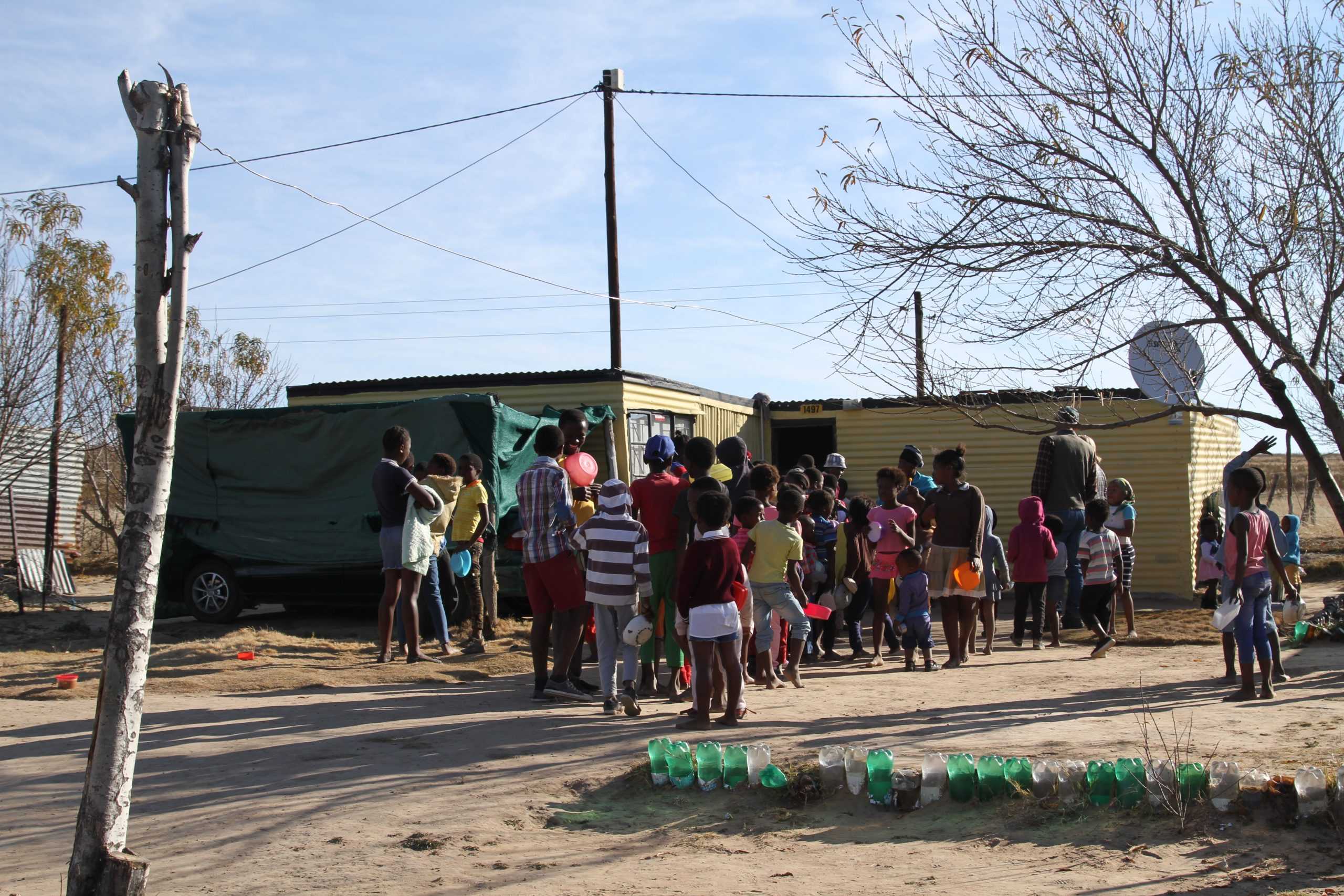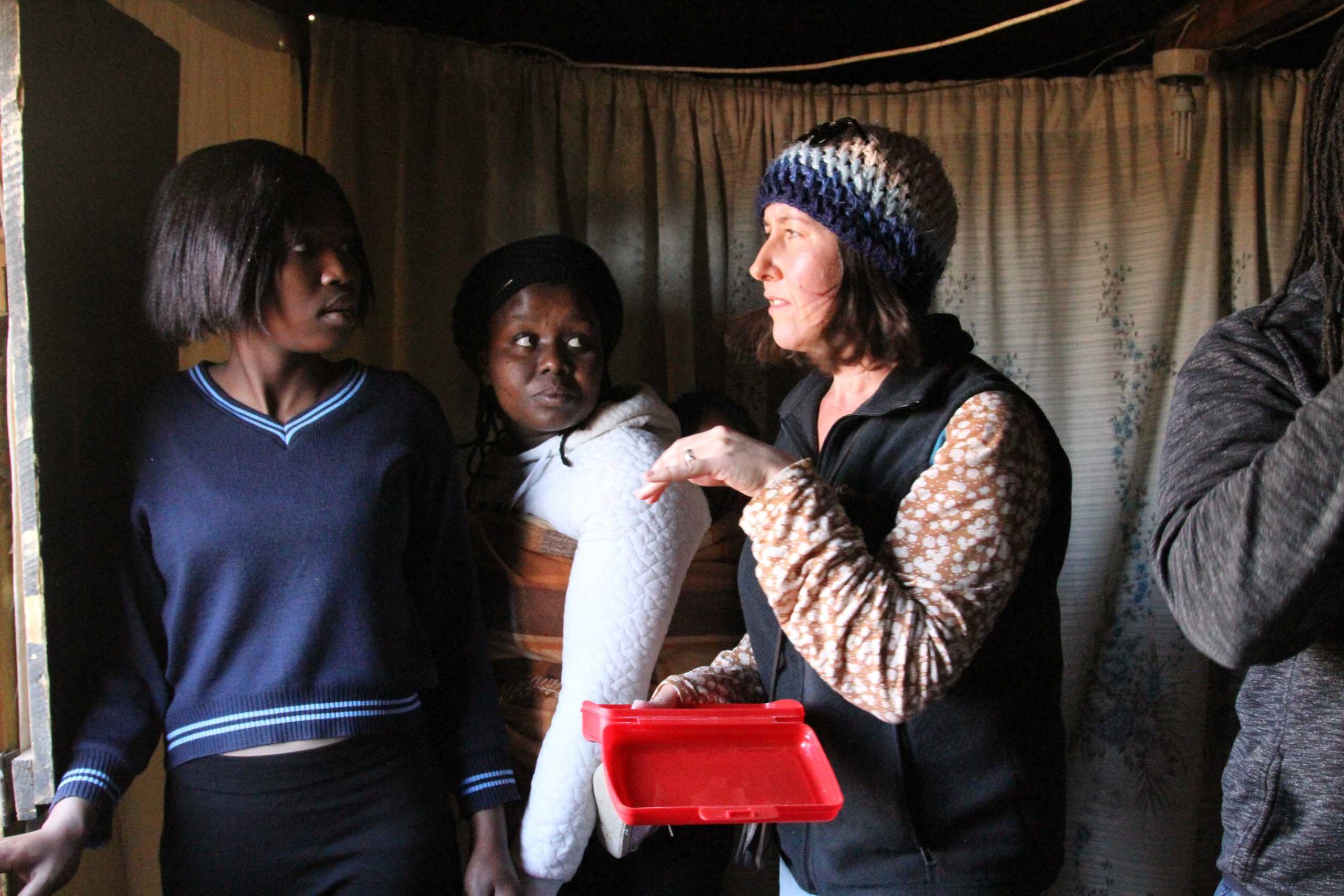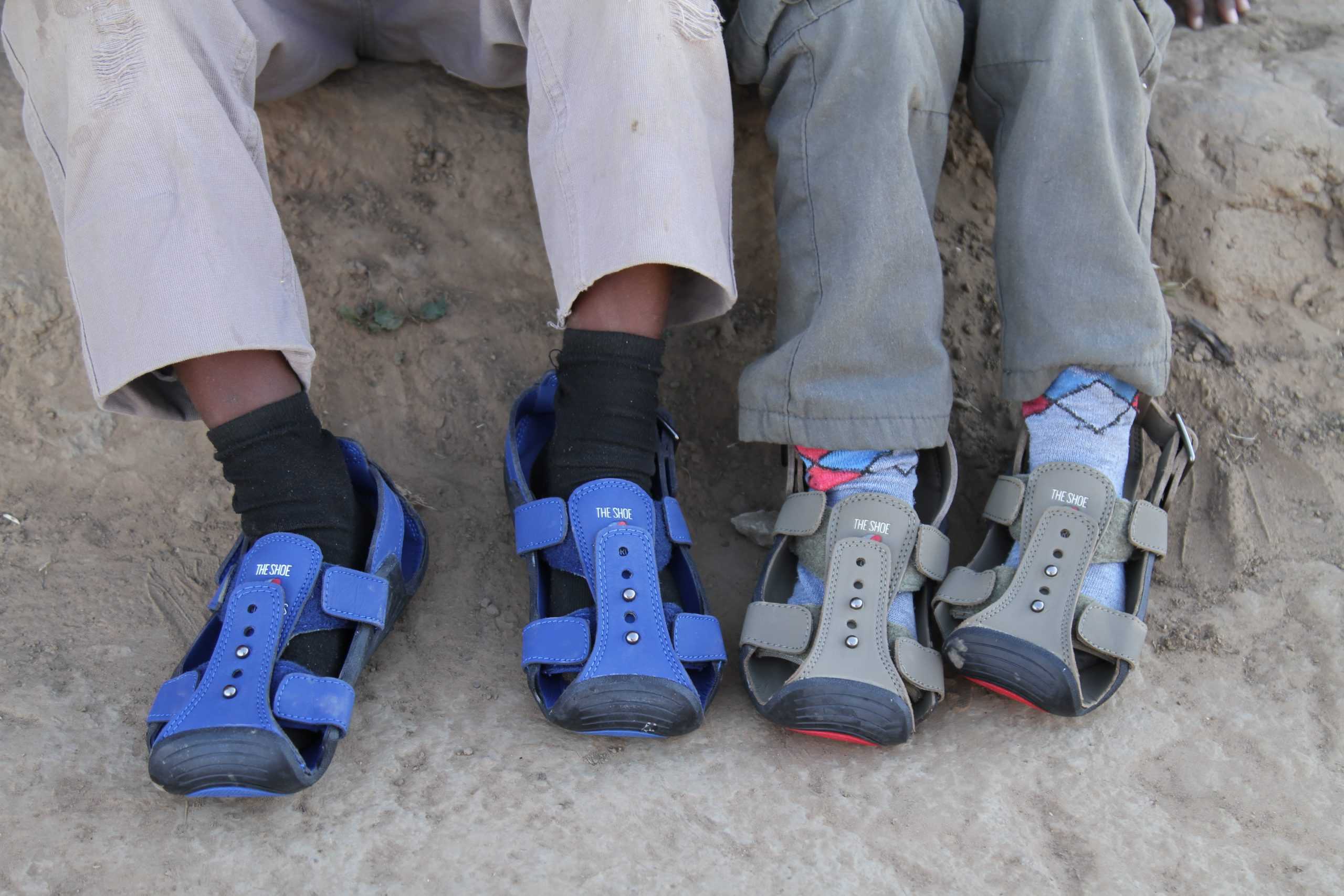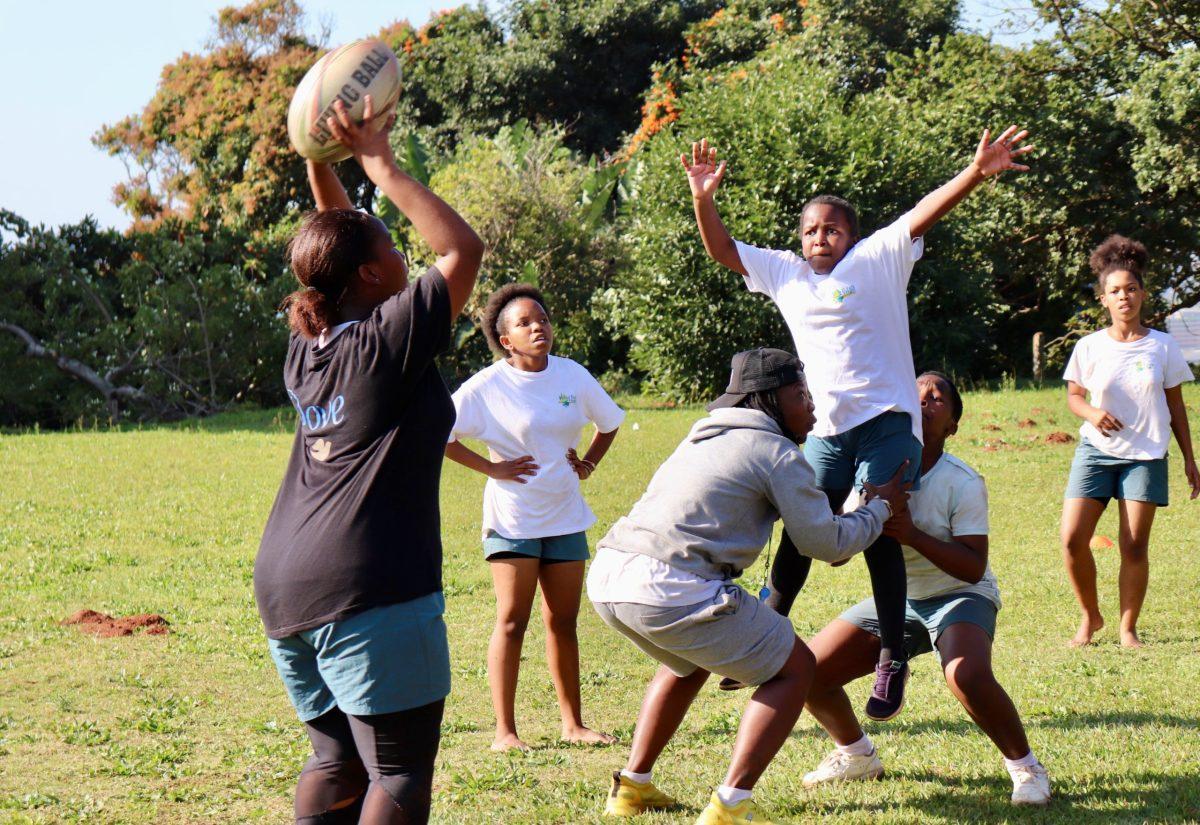Mautse, Free State, South Africa–Shortly after school let out for the day on a mid-winter afternoon in the township of Mautse, children began to line up in front of the home of Dieketseng Mosia.
By 3 p.m., about 100 children, colorful bowls and plastic containers in hand, stood in line at Mosia’s home, a small structure made from corrugated metal sheets. The children, ranging in age from 4 to 14, waited for what could be their only meal that day. Some days they are served cabbage, swiss chard, maybe lentils, though lentils are more expensive. On June 11, they received mielie pap and beans, likely their only source of protein for the day. Many of the children in Mautse are malnourished, low in iron and protein.
The children looked through the dark opening of Mosia’s house, the bottom half of the split door closed, the top half open. They were waiting for the white woman in charge, Corné Stone, to signal that it was time to eat.
First, though, Gertrude Mashiane, a Mautse high schooler whom Stone employs to translate the children’s native Basotho language into English, lead them in a simple prayer.
“The prayer means ‘Thank you for our food, amen,’” Mashiane explained.

Mashiane’s employers, Corné Stone and husband Shannon Stone, work under the umbrella of Global Outreach Foundation (GOF), an evangelical Christian organization headquartered in Charles Town, West Virginia.
“They keep us accountable and offer spiritual support,” Corné Stone said of the couple’s ties to GOF.
The black township of Mautse, where the Stones work as missionaries, has a population of about 7,000, many of whom live close to or at the poverty line. An enduring reminder of the legacy of apartheid, a single road, the R70, separates Mautse from the small farming community of mostly white Rosendal, with a population of just over 100. Rosendal is a tourist destination and home to a thriving arts community.
Corné Stone grew up on a farm near Rosendal, in a municiplaity where, according to South African government statistics, almost one third of the ecnomic activity is atrributed to farming. Shannon Stone is from Florida, in the United States. The two met in Amsterdam while working together at a Christian youth hostel called the Shelter. In 2014, they began their ministry in South Africa. Five and a half years later, their reason for being there remains the same.

“We wanted to help people,” Shannon Stone said. “It is good for people to know what it is like to live off a dollar a day.”
Twice a week, 200 children at two different sites in Mautse receive a free meal that the Stones coordinate.
“We hope to increase it to three times a week, but currently can only afford twice a week,” said Corné Stone.
The Stones focus on feeding children rather than adults because they said what adults need are jobs, and the ability to care for themselves, Shannon Stone explained.
“Just the kids eat because it is a need that we can meet,” said Shannon Stone.
Jobs are scarce in Mautse, though. Some of the women work as domestic help across the road in Rosendal, Shannon Stone said. But Mautse has far more people than Rosendal has jobs.
Because of that, the Stones employ and train individuals like Mashiane, their translator, to aid in their ministry. Mashiane assists with the free meals.
“It is amazing [to see] the children eating,” said Mashiane, who lives in Mautse with her three siblings, grandparents, aunt and uncle. “I am happy.”
On that Monday afternoon in June, after about 30 minutes of scooping beans and pap, Corné Stone started to run out of food. Shannon Stone said Corné likes to do the scooping because she thinks others are skimpy with portions. She asked him how many kids were left in line. There were 30 children left, then 20, then 30 again. The line did not seem to end.
“We are always afraid of running out of food,” Shannon Stone said as he stood outside Mosia’s home, watching the growing line of children waiting for their meal.
After Corné Stone scraped the last of the pap from the pot, Mashiane told the remaining children that the food was gone. As they walked away, Corné Stone noticed a young girl in pink, whom she recognized from the ministry. She asked Mashiane to call the girl back. The girl came quietly, her face expressionless, and Stone filled the girl’s bowl with crusty bits of pap.
Stone is a registered nurse who received her degree at the University of Free State in Bloemfontein. While visiting people involved in their ministry, she checks for signs of illness. Stone knows the limited ability each family living in Mautse has and gives out medical advice accordingly.
Because of her medical training, Stone can also spot signs of malnourishment, pinching the children’s cheeks to determine their skin elasticity, said Shannon Stone, who points out two children waiting in line for their meal with physical characteristics of malnourishment.
Brittle hair, loss of skin elasticity and stomach protrusion are all common physical signs of malnutrition. When Corné Stone notices these signs, she rations out larger portion sizes to the children who need it most.
Dieketseng Mosia is one of a handful of Mautse women who rents out her home as a place to cook for and feed the children. Mosia and Corné met each other while cooking at a bible study in Mautse’s Roman Catholic church, St. Rose.
“It is not difficult,” said Mosia, who has two of her own children, a 2-year-old and a 10-year-old. “I do not have any other work.”
The food for the free meals comes from donations, said Shannon Stone. The mielie pap is donated, and farmers from the area help to donate food. The Stones also pay laborers who grow food that they then purchase.
In the township of Mautse, crowded water spigots are situated every 50 to 100 meters from each other. In an effort to increase healthy eating, the Stones tried implementing gardens with drip irrigation systems in the Mautse community.
Pushed up against the side of a wire fence in Mosia’s yard, remnants of plastic bottles litter a rectangular patch of soil. The livestock nearby have made it a nearly impossible task for the gardens to flourish and are unsustainable, Shannon Stone said.
The Stones have identified other areas of need in the community that they try to address. One of these is shoes. Many of the children are barefoot, even in winter.
After the Monday afternoon meal has been served, Corné Stone pulled out a few pair of rubber shoes from the trunk of her white Land Rover that is parked near Mosia’s home. She looked to Mashiane and some of Mosia’s neighbors to help her find the homes of children in their ministry who need shoes. About 200 to 300 children in the ministry will receive a pair of expandable rubber shoes, donated by friends in the United States, that are supposed to last around five years.
“The children love the shoes and need the shoes,” said Corné Stone. “They have value and are not just a pair of shoes for them.”

At one of the homes on her list, a small boy coughed as Stone and Mashiane entered. Stone lifted the boy’s shirt so she could listen for an origin of his congestion. She then signaled to Mashiane, asking her to translate instructions to the boy’s mother on what to do if his situation grew worse. Before leaving, Stone made a note of the boy’s name and his home so she could check back on him.
A short time later, Mashiane told Stone someone in Mautse needed her to pray with them. Stone directed her husband to go on without her, and she and Mashiane walked away to pray.






































Sue Brown • Jun 22, 2018 at 6:29 pm
This well written article really transported me to the meal line…bless the Stones!